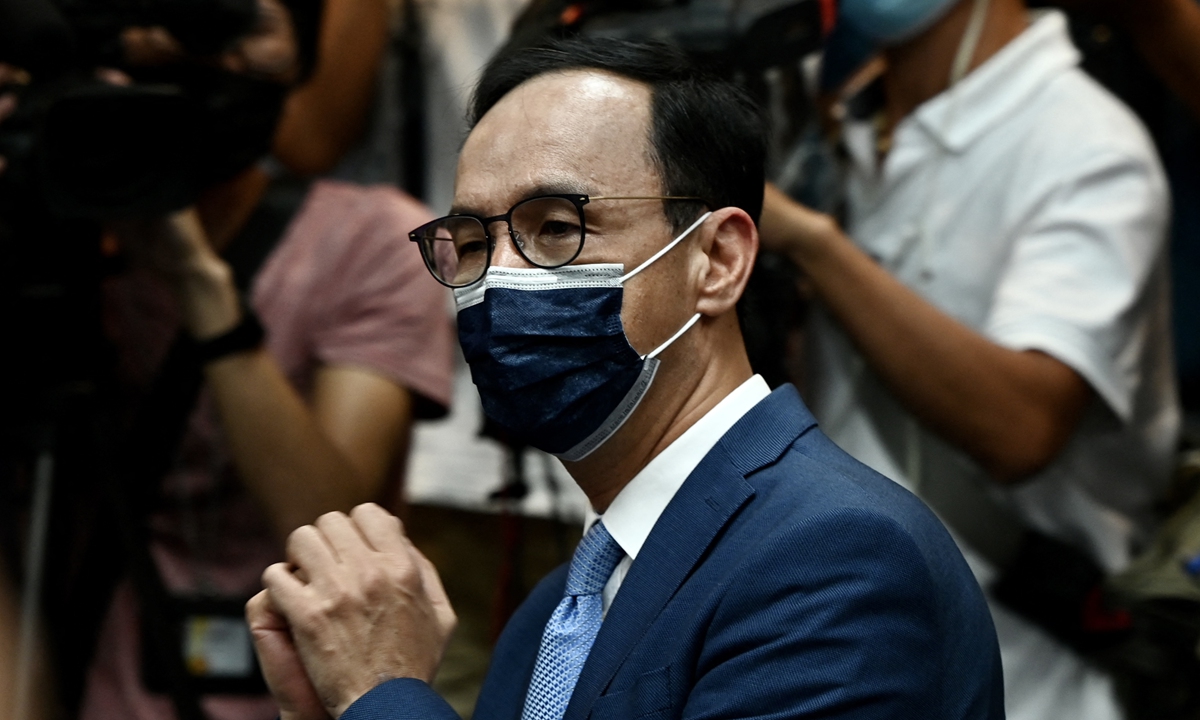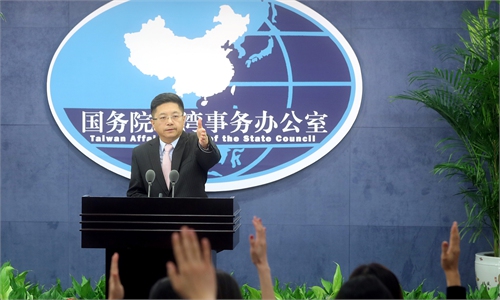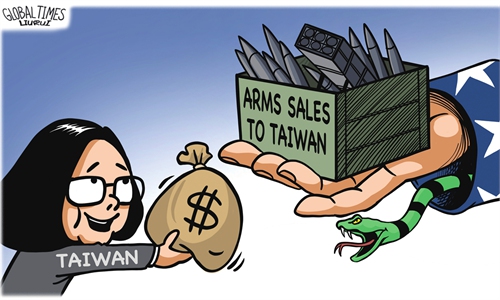Adhering to the ‘1992 Consensus’ constitutes the advantage of KMT: Global Times editorial

Chinese KMT's chairman Eric Chu Li-luan Photo: AFP
The comments made by Eric Chu Li-luan, chairman of the Chinese Kuomintang (KMT), during his visit to the US had drawn public attention. He said in a speech that the KMT has always been "pro-US" and called the 1992 Consensus, which allows for "creative ambiguity," a "no consensus" consensus. However, in an interview with a Hong Kong media during the same period, Chu made it clear that he opposed "Taiwan independence" and expressed his hope for the continuation of the "1992 Consensus" across the Taiwan Straits.
Apparently, there are distinct differences in Chu's statements on the "1992 Consensus" on various occasions, which is related to the current confusion of ideas within the KMT. As Taiwan's "nine-in-one elections" are approaching at the end of the year, and as the KMT has high hopes for Taiwan's leadership election in 2024, it is widely believed that Chu's visit to the US is aimed at regaining the trust and support of the US and building momentum to boost the KMT's election campaign. In particular, since taking power, the Democratic Progressive Party (DPP) has been waging "green terror" on the island, seeking US support for "independence" as a lifeline while labeling the KMT with "pro-China, anti-US," making the KMT look rather passive.
Under such circumstances, the KMT has become ideologically shaken and divided, with some being beaten unconscious by DPP's rogue punching combinations and thinking that they lost the election because they were not "pro-US and anti-China" enough. Therefore, some KMT members are afraid of the idea of cross-Straits reconciliation, and there is even the absurd idea of abandoning the "1992 Consensus" or changing the party's name to "Taiwan KMT" to break the DPP's offensive.
It should be pointed out that this idea is politically naive and will never give the KMT any chance to "turn the tide," but will only make it lose even more. If the KMT is racing with the DPP on the road of "pro-US and anti-China," it is bound to lose. The end of this road is the precipice of "Taiwan independence." The faster the DPP goes, the sooner it will crash. Other political forces on the island need to be especially vigilant not to be pulled in by the DPP as a funerary companion.
Anyone with a discerning eye understands that adherence to the "1992 Consensus" was not the reason for the KMT's defeat. Otherwise, why could Ma Ying-jeou, who upheld the "1992 Consensus" in 2012, defeat Tsai Ing-wen, and why could Han Kuo-yu, who adhered to the "1992 Consensus," set off an "insanity for Han Kuo-yu" in southern Taiwan? Facts prove that the KMT's great advantage lies precisely in cross-Straits relations, in its adherence to the "1992 Consensus." If moderate voters are willing to vote for the KMT, it is because they believe that the KMT can stabilize cross-Straits relations, rather than turning the Taiwan Straits into a dangerous powder keg like the DPP has done.
The one-China principle embodied in the "1992 Consensus" is the basis for developing cross-Straits relations, and is related to the future and destiny of Taiwan island and the well-being of Taiwan compatriots. The KMT has lost the past two regional leadership elections on Taiwan island. And the party is also at a disadvantage in the island's local elections and various key political agenda. There are many reasons triggering this situation, such as insufficient access to the grass roots, isolation from the masses, serious seniority discrimination, and lack of attraction to young people. All these require the KMT to take effective measures to rectify. To some extent, it can be said that the "1992 Consensus" is the soul of the KMT today. If the soul is lost or hollowed out, it can only make its own path increasingly more narrow.
Just as Taiwan Affairs Office spokesperson Ma Xiaoguang said on Thursday that "Cross-Straits affairs are a family matter concerning compatriots on the two sides of the Taiwan Straits. It should be handled through consultations with family members rather than outsiders." The core tenet of the "1992 Consensus" is that "the two sides of the Taiwan Straits belong to one and the same China and should work together to promote the reunification of the nation." This consensus, reached in correspondence and telegrams between the two sides, is clear in black and white. It was on the basis of the "1992 Consensus" that the two sides of the Taiwan Straits initiated consultations and negotiations, opened up a bright path for the peaceful development of cross-Straits relations. In other words, the so-called creative ambiguity cannot be separated from the one-China principle, and there should be no room for wordplay on such a crucial issue.
As a matter of fact, both Taiwan's so-called constitutional rules and the party constitution of the KMT clearly support one China and oppose "Taiwan independence." The KMT should clearly explain the one China and the "1992 Consensus" to the residents of the island from the perspective of law, reality and history, and construct a stronger political consensus on the island. The more the KMT dodges, the more distrustful the public on the island are. If the KMT intends to speculate, in the end, it will gain support from neither side. When it comes to major issues concerning the interests of the Chinese nation and rights and wrongs, only by keeping clear-headed and taking a long-term view can we stand on the right side of history.
We have also noted that the KMT said on Thursday evening that it will carry out various work conducive to cross-Straits peace and stability, exchanges and cooperation, and economic prosperity on the existing political basis. Just as the old Chinese saying goes, "Knowledge is the beginning of actions, and actions are the result of knowledge." At a critical juncture in the development of cross-Straits relations, the KMT should take the courageous responsibility of combining knowledge and actions, rather than making a mess of itself in the face of "green terror." Only in this way can the path of the KMT become increasingly wider.


